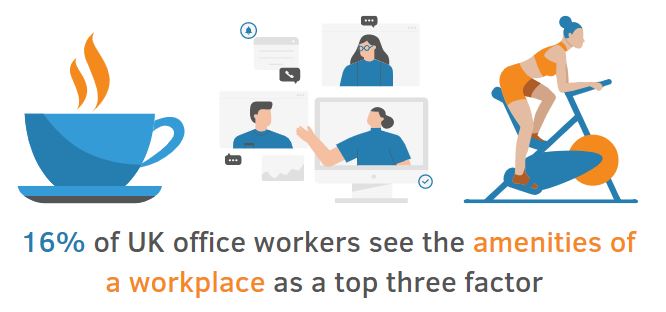 We asked 450 working Britons to rank a list of ten commonly offered workplace factors and employee perks to determine post-pandemic working preferences. This poll made sure to limit selected respondents to office workers, a group whose previously stringent 9-to-5 schedules and daily working rituals were heavily impacted by COVID-19. The ultimate goal of this poll is to provide businesses across the UK with a general indication of the workplace factors and employee perks most valued after the seismic disruptions of the pandemic.
We asked 450 working Britons to rank a list of ten commonly offered workplace factors and employee perks to determine post-pandemic working preferences. This poll made sure to limit selected respondents to office workers, a group whose previously stringent 9-to-5 schedules and daily working rituals were heavily impacted by COVID-19. The ultimate goal of this poll is to provide businesses across the UK with a general indication of the workplace factors and employee perks most valued after the seismic disruptions of the pandemic.
These ten workplace factors and employee perks were presented to respondents in a random order and included:
- Competitive salary
- Flexible working hours
- Ability to work remotely
- Office space amenities and facilities (e.g. gyms, showers, stocked kitchens, etc.)
- Corporate social responsibility (e.g. charitable endeavours, volunteering opportunities, sustainability practices, etc.)
- Values and company culture
- Career opportunities (e.g. training and promotion)
- Transport links (proximity to trains, buses and major roads)
- Access to mental health support
- Networking and social events
Key Findings
 When examining the results of our poll, we focused heavily on which factors emerged as top three priorities for UK office workers. With this in focus in mind, we noted that:
When examining the results of our poll, we focused heavily on which factors emerged as top three priorities for UK office workers. With this in focus in mind, we noted that:
- Unsurprisingly, a competitive salary remains the most important workplace factor for office workers, with 53% of those polled placing it in their top three preferences.
- The offer of flexible working hours closely followed, with 49.5% picking this factor as a top three priority.
- In a similar vein, the ability to work remotely garnered a lot of attention from UK office workers. This perk saw 42.4% of respondents place it in their top three.
- Of office employees polled, 27.7% held access to mental health support services as a top three factor to consider.
- 25.5% of UK office workers view career opportunities as a top three priority
- Quality transport links are a top three employee perk for just 20.2% of office workers.
- Corporate social responsibility is currently not a major priority for employees, only 20% placed this factor in their top three and 36.8% considered it a bottom three priority.
- Good company culture and strong values are attractive factors for returning office workers, but don’t feature prominently at the top end of employee desires. 17.3% of respondents placed this perk in their top three.
- Amenities and facilities struggled to feature in workers’ wants, with only 16% of respondents ranking things like on-site gyms, end of trip facilities and free beverages in their top three.
- Interestingly, 15.7% indicated opportunities for socialising and networking as their number one employee perk. Conversely, 26.8% rated this as their single least desirable employee perk.
 Getting workers back to work in 2022
Getting workers back to work in 2022
It’s glaringly obvious to most observers that workers gained a lot from the shifting power dynamics seen to occur throughout 2021. As vaccination rates increased and the COVID-19 pandemic began to wind down, optimism slowly started to return to the job market – resulting in a notable uptick in the advertisements for on-site, in-office jobs. Accompanying this generally positive sentiment was an almost audible sigh of relief from businesses owners across the UK – as a return to a sense of normality in the workplace began to firm as the likeliest scenario. However, many office workers had a completely different perspective on the situation, one that involved drastically altered ideas surrounding how work, and the workplace, would look when the dust settled.
Despite this difference in opinion, news reports serve to celebrate and echo the sentiments of industry heads poured in from a number of mainstream outlets. Talk of returning to ‘business as usual’ was discussed almost as if it was a foregone conclusion, that the previous two years of change could be easily forgotten in favour of a return to pre-pandemic norms. Business owners showed their cards early, making their desire to attract in-house talent more than obvious. This has resulted in a unique situation in which top prospects, particularly those who have become used to the benefits of remote work, are freely able to demand more employee perks and benefits from businesses in exchange for their talents.
We’ve already seen a drastic rise in both hybrid and fully-remote workers since the start of the pandemic, something which has spurred others to pursue similar schedules. Fast forward to mid-2022 and flexible working arrangements seem to be a perk that many employees expect as a bare minimum, particularly those in industries that are highly conducive to such a schedule, including tech and marketing. But what of the other employee perks and workplace factors that employers tout? A quick glance at current job advertisements will present an array of new and unique perks on offer from businesses looking to come out on top in the hunt for employees. In fact, the simple act of choosing the right employee perks to offer has been a challenge for businesses. How are these company perks and workplace factors viewed in the eyes of UK office workers? The results of our poll certainly indicate that some perks and workplace factors far outweigh others, with salary and general compensation unsurprisingly reigning supreme. However, we were surprised in a number of other respects when investigating our findings.
Elaborating on the summary of our findings that is found above, we wanted to properly investigate the workplace perks and benefits employees want most post-pandemic. Read on to learn more:
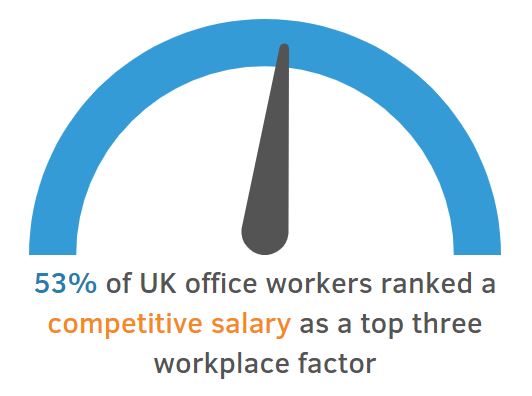
The majority of UK office workers ranked a competitive salary as a top three priority
This result is probably unsurprising to many, largely due to the tangible benefits that money provides. From increasing a worker’s financial security to the simple nature of alleviating the cost of living, a good salary’s desirability is almost self-explanatory. Added on to the fact that it’s been a job hunters’ market for the past few months – with top talent holding much of the bargaining power in the recruitment process – it’s no wonder office workers have been able to harness their talents to command higher salaries.
Along with the basic salary package, major companies are increasingly offering sign-on bonuses to pin down top talent, securing their new hires quickly and snatching them away from competitors. Particularly common in tech, where there is an obvious shortfall in skilled workers to meet the huge demand, this trend goes a long way towards illustrating businesses’ desperation in the current labour market.
Exemplifying the extents to which tech companies are willing to go, Forbes noted in December 2021 that Apple was offering bonuses ranging up to $180,000USD to retain top talent and ward off poaching by Meta. Tech is largely a global recruiting market, so the picture doesn’t differ too much in the UK’s tech and knowledge sectors. The sentiments from our poll are further backed up by BeeLiked’s study in 2021, finding that financial bonuses topped out their list of 10 most requested employee benefits in the UK, holding a whopping 37% of the vote.
In this current employment climate, it’s no surprise that office workers can afford to be picky and take their time, waiting for remuneration figures much more competitive than those offered just two years ago. Business leaders and industry heads across the UK have been crying out for vacant positions to be filled in recent times, emboldening workers to push up the salaries and workplace benefits on offer.
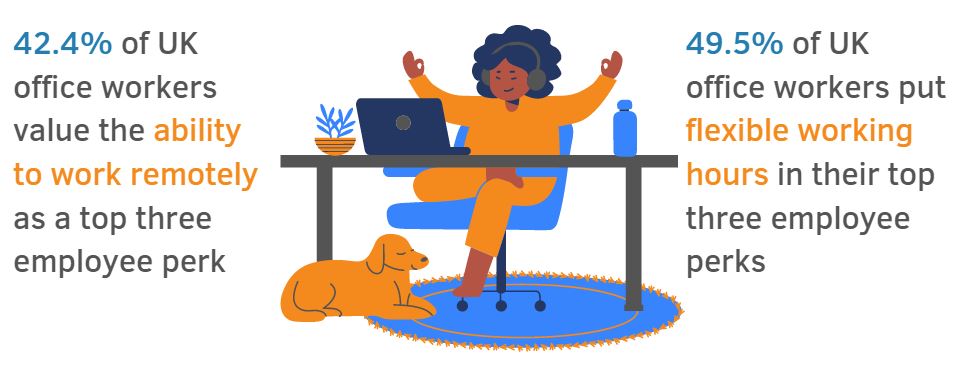
Flexible working hours and remote work closely follow as prominent employee perks
Flexible working hours and the ability to work remotely ranked second and third respectively in our poll, with 49.5% of UK office workers placing a flexible work schedule in their top three and 42.4% championing the idea of remote work. It’s obvious that demand for flexibility – in terms of hours and work environments – is at an all-time high, fuelled by technological advances and changing sentiments about the viability of remote work from jobseekers and existing employees.
Ideally, we would have data pulled from a pre-pandemic poll to compare against recent figures in order to determine whether demand for flexibility has increased as a result of the recent events. Luckily, however, we have the power of the internet for searching similar studies prior to COVID-19. In a report produced by Timewise.co.uk, the proportion of jobs being offered flexibly was at 17% in 2020 Q1 (pre-COVID). This number increased to 26% by August 2021, just four months after the end of lockdowns and after most restrictions had been eased across the UK. When comparing these figures to those seen in our study, it’s clear that there is obviously a disparity between the number of jobs offering flexibility and general demand from workers. It wouldn’t be presumptuous to assume that a similar disparity existed in the pre-pandemic working environment, especially considering wide-scale remote work hadn’t been tested by many businesses until the pandemic forced so.
The results from our poll make it abundantly clear that there is a demand for flexible work amongst UK office workers and the improvements to work-life balance that it provides. For businesses still looking to fill jobs across a number of sectors, offering this sought-after perk may go a long way towards alleviating many of their struggles. The large number of coworking spaces that are appearing across the UK, particularly in sought-after London locations such as Shoreditch, City of London, Canary Wharf, and Bank.
Workplace amenities seemingly serve as a secondary priority
Though they’re regularly highlighted in job postings, and listings for serviced office space, added perks and amenities such as onsite gyms, end of trip facilities, and free food are clearly not the top workplace add-ons that office workers are seeking. Only 16% of returning UK office workers consider extra workplace amenities to be in their top three most desirable employee perks. The bulk of those polled, 242 workers out of 450, found these added workplace perks to be middling concerns (ranking them between 4th and 7th) to them when considering taking an office job.
These factors are regularly trumpeted on job ads and CRE listings in an obvious attempt to lure workers, but the broadcasting of these perks and benefits to job hunters seems to take a back seat when compared to the tangible benefits provided by flexibility and monetary compensation. The allure of world-class amenities and convenient benefits seem to serve as more of the icing on the cake for UK office workers, as opposed to a primary concern.
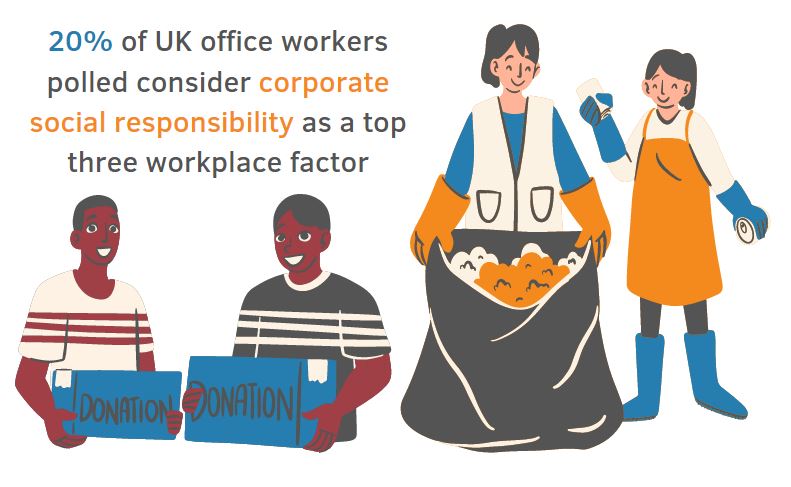
Corporate social responsibility lags behind
A total of just 20% of UK office workers ranked factors such as support for charitable causes, volunteering opportunities, and sustainable practices in the workplace as a top three workplace factor. In fact, 36.8% of respondents ranked this in their bottom three. These results will probably come as a surprise to most, considering popular current sentiment around social issues.
Corporate investment in these areas – which largely come on the back of observable public interest – obviously doesn’t align with the priorities of many current UK office workers. This observed pragmatism is probably due to the fact that there is still a lot of uncertainty in the market. As the working class bears the brunt of the pandemic’s ill effects, much of their concern still lays primarily with maintaining their personal security and keeping their own house in order.
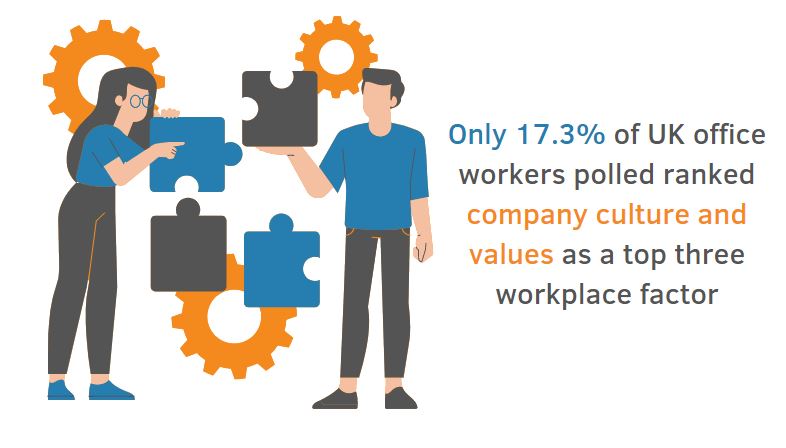
Company culture and values are attractive job factors for UK office workers, but not top priorities
From our poll, there was a cluster of almost exactly 50% of workers who place company values and culture just in the mid-range of the important workplace factors they want. Though company values and culture do feature prominently when considering a workplace, office workers by and large don’t put these factors in their top priorities, with only 17.3% of UK office workers ranking it in their top three.
That we see this highlighted disparity in the expected versus the observed reality in desired job aspects further cements the notion that COVID’s after-effects have lingered – to the extent that workers’ priorities largely lay with the factors that will have the most impact on their day-to-day personal situation. With that being said, it’s clear that the values and culture of a company will definitely play a not insignificant role in the daily lives and outlook of the average office worker.
In this changed working world, and with asynchronous hybrid and remote work on the rise, we could pessimistically be seeing the start of further employee detachment from their employers – and not just in their physical office presence anymore. Diminished regard for their employer’s stated values, and the workplace culture that employees would inhabit, could herald a future where the nuts and bolts of the actual ‘work’ getting done is employees’ primary personal directive, with everything else accompanying their employment becoming gradually more and more supplementary and discarded. The results we’ve seen aren’t really so drastic to support such a profound inversion of working life in the future, but it’s an interesting outside possibility to consider, nonetheless.
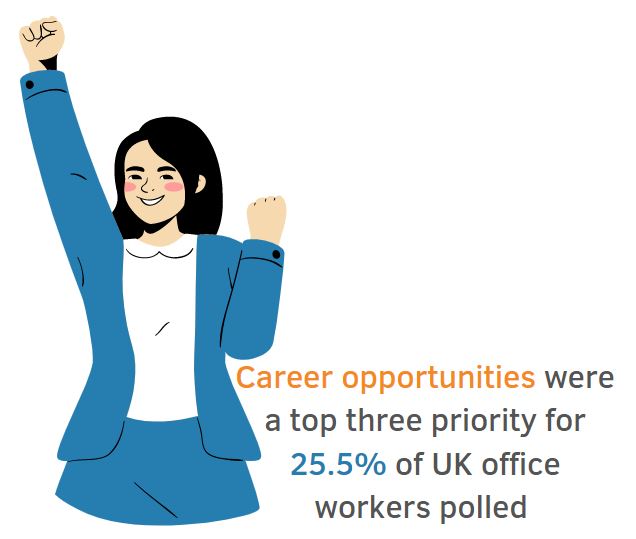
Potential career opportunities seem to have taken a back seat to other priorities
This statistic ties in to the theme established with our prior findings – that priorities for returning workers are largely centred around pragmatic concerns; those that can have the most impact on the fundamentals of their daily lives and continued security. Opportunities for growth and professional development within an organisation pertain more to a worker’s future outlook – they’re not a concern for practicalities of the ‘now’ – so we see workers’ rationalism again largely on display with this 25.5% figure.
The world of work has certainly changed, but since there is still some demand out there for more traditional aspects of the pre-COVID work life, like office space (if in diminished traditional usage) and a job’s more social elements, this points to a future where working won’t be so irrevocably changed to be unrecognisable. As workers and employers become more comfortable with the new state of work, workers will likely pursue career opportunities where growth and advancement factors feature more prominently; since worries about the near-term stability of the economy will have been put to rest and people look to the future with more assurance in their aspirations. Employee development is vital for the success of any business and will always be sought by those looking to make strides in their chosen industry, however, it seems that the road to employee satisfaction is currently paved through perks and benefits offered in the now.
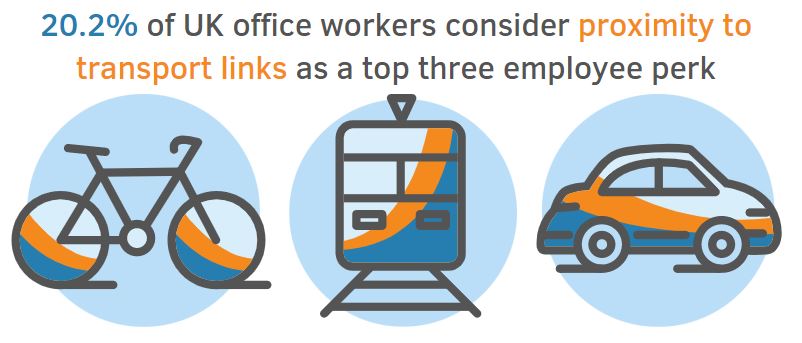
Proximity to transport links is not a major factor for the majority of UK office workers polled
That only 20.2% of UK office workers polled prioritised having easy access to transport links near their work is probably a reflective percentage of the wider British population who see this perk as somewhat of a given. With the vast majority of UK office workers finding themselves already close to exceptional public transport links, and the fact that a large chunk of those polled indicated close transport being of middling concern, probably indicated this factor to be more of a non-essential perk. The lack of primary demand for transport links can also be connected to the high demand for flexibility in the workplace, with remote work obviously lowering requirements for connections to local business districts and commercial sectors.
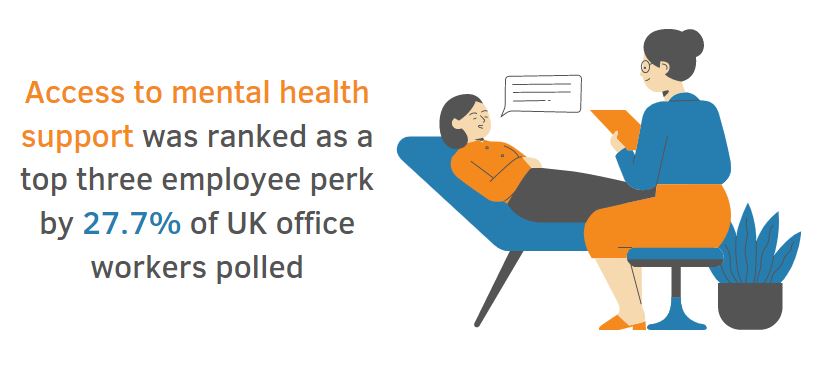
Mental health support ranked highly, making it the fourth most demanded employee perk
Employee wellness and overall employee happiness has been a major focal point over the course of the last two years, with many businesses offering perks and wellness programs designed to encourage employees to improve their own personal health. With 27.7% of respondents ranking it in their top three, it’s clear that employee happiness and general mental wellbeing is more important than ever.
These results seem to be in line with many of the headlines surrounding wellness at the height of COVID-19, headlines often centring around potential psychological issues stemming from continued isolation and fears associated with contracting the virus. An ongoing study first published by Mind.org.uk in June 2020 indicates that 25% of people in England experience a mental health problem each year, with 16.7% (1 in 6) of people reporting experiencing a problem in any given week. To get a more nuanced picture of the situation for post-pandemic 2022, the NHS reported that 1.61 million people in the UK (or 2.3% of the overall population) were in contact with mental health services during March 2022. There is obviously a large disparity between the number of people who could stand to benefit from mental health support, and the number who are actually seeking connection with these services. That workers from our poll indicated so comparatively highly for prioritising the presence of mental health support services in their workplace is a great sign that people suffering across the UK may be more generally coming to the point of being proactive about their mental health.
Prior to seeing the results, we suspected these figures would be reflective of the reported rates of the working population making use of mental health services across the entire UK. However, these numbers instead aligned with the general percentage of people in England that experience mental health problems each year. Company benefits seem to be evolving in the right direction, as UK businesses work towards retaining employees by providing access to health benefits geared towards addressing psychological wellness.
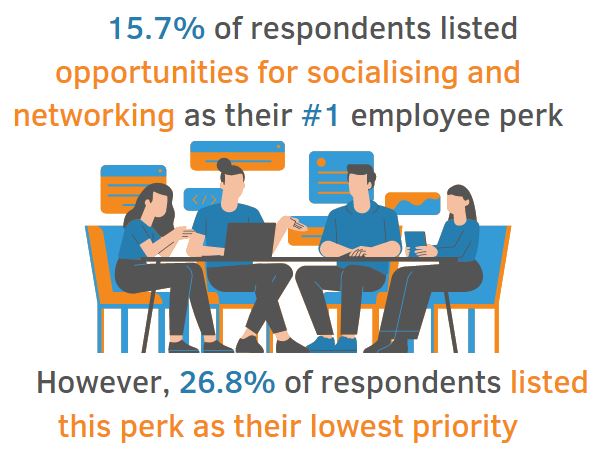
Contrasting opinions on socialisation and networking are clear amongst UK office workers
These large disparities in preferences are probably due to inherent differences in the sociability of any working population; there is always going to be a mix of introverts, extroverts, those who like the opportunities to mingle and socialise. Along with those who prefer to keep their work and social lives more separate.
That such a large proportion of office workers reported social opportunities as their lowest priority is probably indicative of the self-imposed isolation of office workers who’d mostly been cooped up at home working remotely for such a long time. Reluctant surrounding fully engaging with social aspects of the workplace comes as no surprise. When combining this with the increased tendency for pragmatism amongst workers, it’s clear that workplace socialisation and in-person networking is currently considered a secondary concern in the wake of the pandemic.

Final thoughts
Priorities for workplace factors have definitely shifted compared to how things existed in the pre-pandemic world. We can see that certain obvious perks and benefits – such as a good salary – remain highly desired when considering a job, however, it’s also important to note the surge in demand seen for other key perks like flexible work.
The low priorities expressed for things like added office amenities, and even for the corporate social responsibility of a workplace, exemplify this shift – with workers obviously placing more stock in the job factors that will have the most personal impact to their day-to-day. This current prioritisation that we’re seeing is probably due to lingering wariness in the economy, due to many workers’ lives having been turned upside down by COVID, and some semblance of normalcy still being a novel concept.
As people get more used to the post-pandemic world, we expect these priorities to further change, and find a more stable equilibrium. We’ve already seen good signs of this returning optimism and desire for more traditional office aspects with our recent hybrid working study, which showed the not insignificant proportion of office workers who still desire full-time, on-site work. This is despite all the demand from returning workers and the boom in offers for flexible and remote work from managers who’ve been desperate to fill job vacancies. With concepts such as employee retention sitting at the fore, expect to see your typical benefits package increase in an attempt to boost productivity and ensure that employees feel valued.
All of this points to a working landscape that has changed for good, in which employee feedback is leveraged in order to create a more productive and flexible working environment.
For more deep dives into workplace statistics and general office insights, you can visit:
55% of UK Office Workers Favour Hybrid Working, Will the Office Ever Be the Same?
London Office Market Sees Highest Level of Occupier Activity Since Before the Pandemic
How to Deal with the Stress of Returning to the Office after a Long Layoff
10 Ways to Improve Office Morale
An Overview of Coworking Spaces in London
How to Value a Commercial Property and Determine Rent in London

